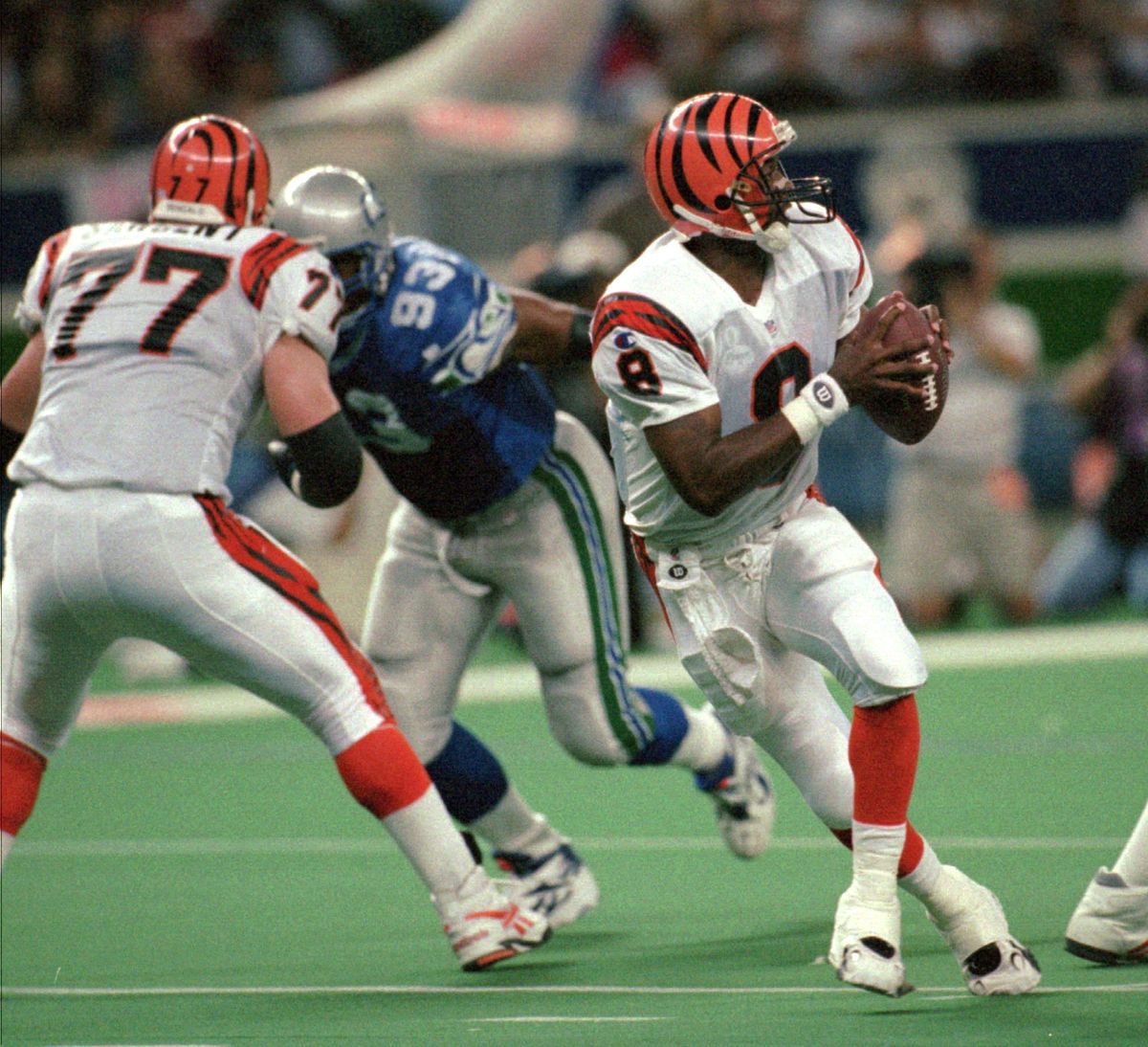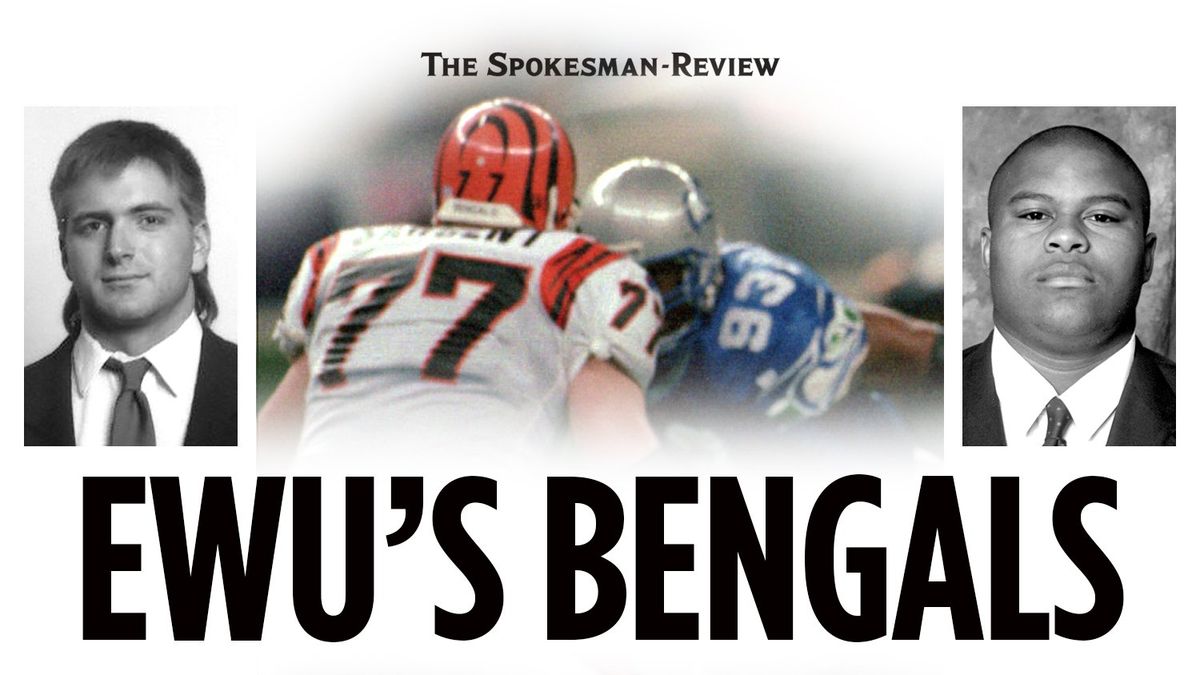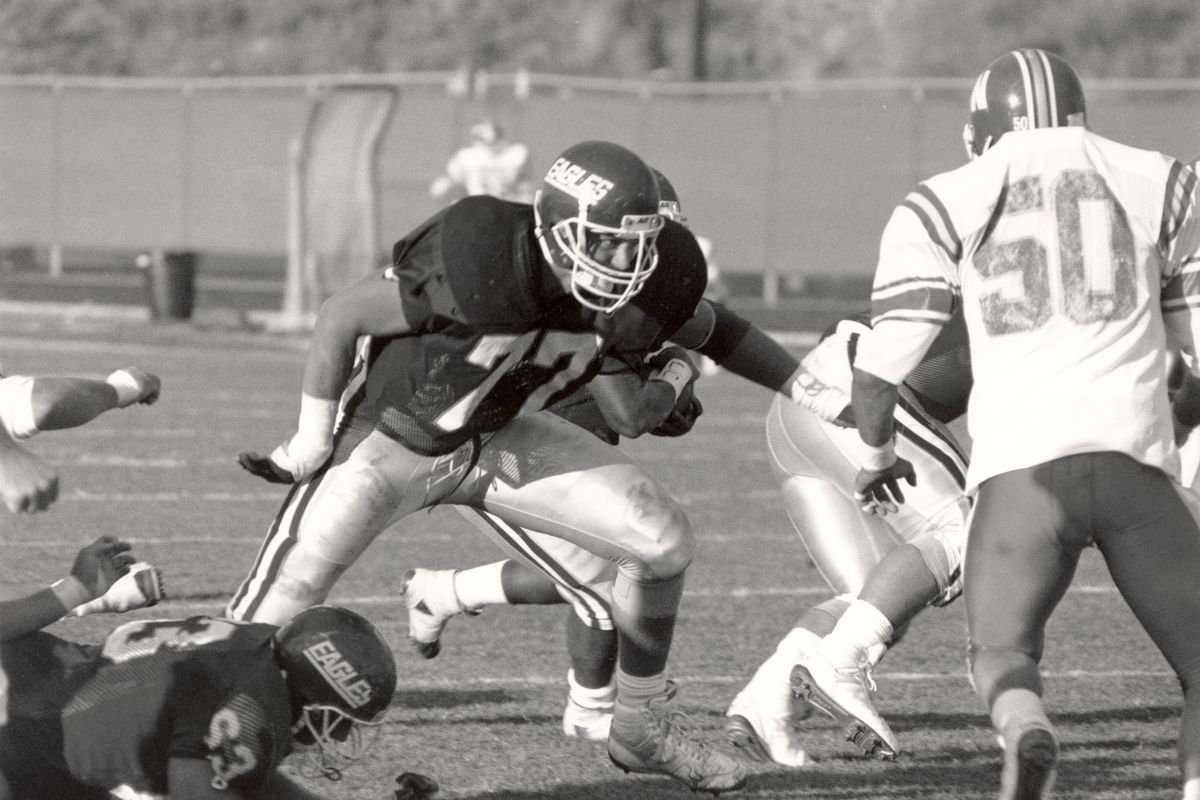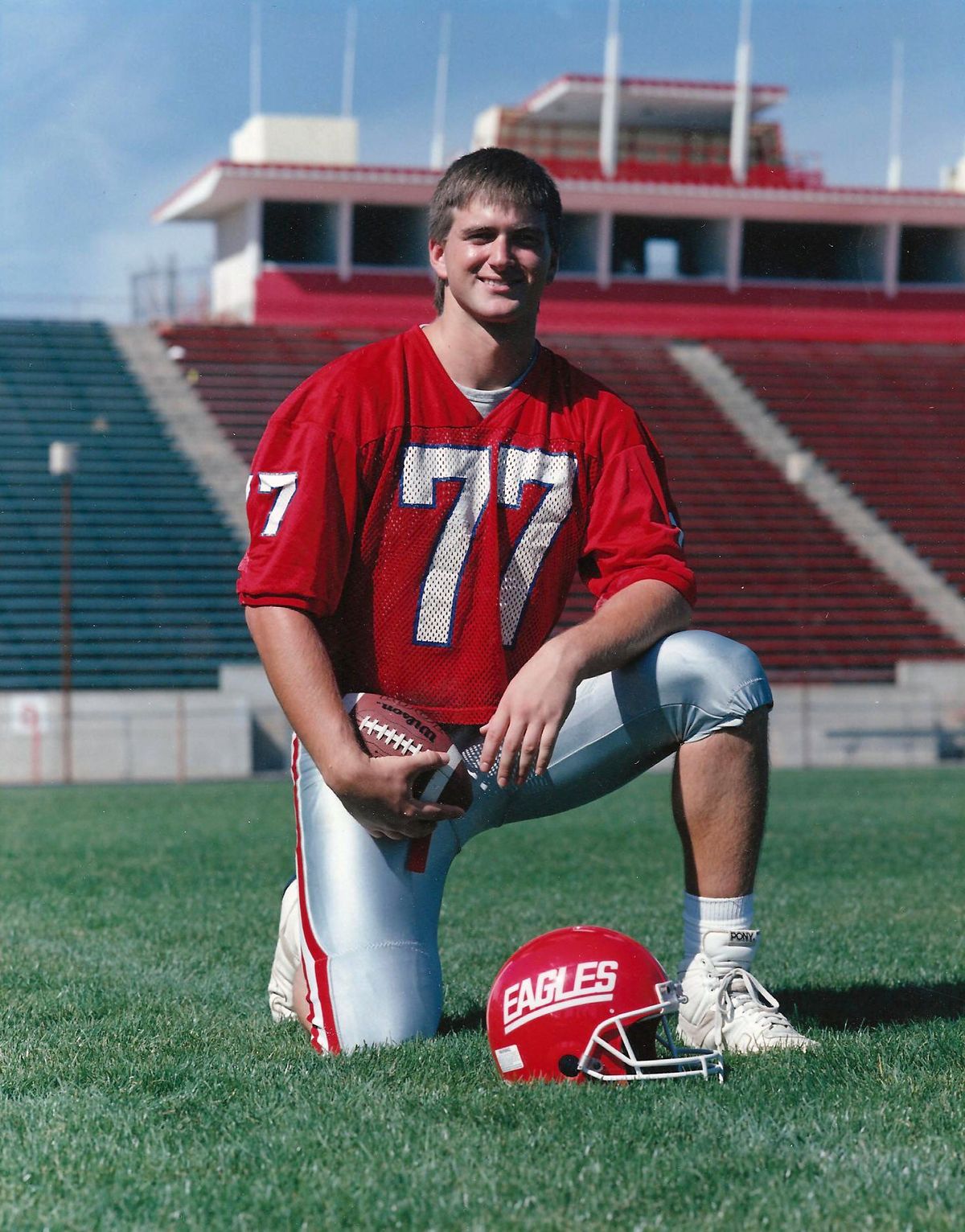‘Who-Dey’ heyday: Former Eastern Washington linemen Kevin Sargent, Trent Pollard enjoyed Cincinnati Bengals’ experiences despite losses
By the time former Eastern Washington offensive linemen Trent Pollard and Kevin Sargent lined up for the Cincinnati Bengals, the team was just a shell of the one that made two Super Bowl appearances in the 1980s.
Ken Anderson, Pete Johnson, Archie Griffin and Forrest Gregg from the 1982 team were long gone. Same with Boomer Esiason, Cris Collinsworth, Ickey Woods and Sam Wyche from the Bengals’ 1989 team, with Anthony Munoz and Tim Krumrie nearly finished in the league.
Those players were among the last representatives of the Cincinnati Bengals to appear in a Super Bowl – until now.
In between the past and present, Pollard and Sargent were proud Bengals, but never got to play on football’s biggest stage. Instead, they suffered nothing but losing seasons for a franchise, which, over time, became better known as the “Bungels” and as the “Who Dey?” team.
Sargent was an undrafted free agent in 1992, and played seven seasons from 1992-98. Two years later, Pollard was a fifth-round draft choice of the Bengals and played in 17 games alongside Sargent from 1994-96.
Former Eastern quarterback Erik Meyer (2006) and offensive lineman Harrison Nikolao (2007) also signed free-agent contracts with the Bengals, and both eventually played for the Spokane Shock in the Arena Football League.
Meyer’s Bengals experience included a minicamp and two preseason games during training camp, but he was cut before the regular season began. The quarterbacks he was competing against were Carson Palmer, Anthony Wright and Doug Johnson, with Palmer and Wright making the cut, along with wide receiver Reggie McNeal, who was an emergency backup at QB.
Nikolao played in all four preseason games in 2007 before he was released. He fondly remembers playing alongside Andrew Whitworth, who is in his 16th season in the NFL and is a starting tackle for the Rams.
Pollard also spent a season in the Rams’ organization – then based in St. Louis – before a knee injury and subsequent surgeries ended his career. It all adds up to more than a casual interest when the Bengals and Rams – Los Angeles this time – square off on Feb. 13 in Super Bowl 56.
“I just want the Super Bowl to be a great game,” Pollard said. “I’m probably leaning toward the Bengals for sure. (Cooper) Kupp is tearing the league up, so of course I’m rooting for him, too. That will be a fun game to see.”
Some 25 years after Pollard and Sargent played and 15 after Nikolao had his shot, remembrances are plentiful. Allegiances not so much for a franchise that last advanced to the penultimate game in the National Football League 33 years ago.
“I’m rooting for the Rams to win,” said Nikolao, who settled in Cheney and watched Kupp play countless times at Roos Field for EWU. “But I’m also happy to see ‘Who Dey’ in L.A. for a shot at the championship.”
Pollard still has his helmet, plus some jerseys from his playing days, and his 13-year old daughter even wears one from time to time on Throwback Thursdays at her school. It may even be worn on Super Bowl Sunday, but not by Trent for something other than sentimental reasons.
“Oh, it will fit her fine,” said Pollard, who was 6-foot-4 and 330 pounds when he played, always in skin-tight uniforms to keep defensive players from getting a grip on it. “I might be able to get it on, but it’s never coming off.”
Pollard, an assistant principal at Cleveland High School in his hometown of Seattle, was an athletic three-sport star at Rainier Beach High School when he came to EWU in the fall of 1990. Unusually quick and agile on his feet for such a big player, he began as a defensive lineman, then moved to offensive line under Mike Kramer.
Pollard became a two-time, first-team All-Big Sky Conference selection under Kramer’s tutelage, and was an All-American and pro prospect as a senior in 1993. That was the year Paul Wulff joined the Eagles’ coaching staff as a volunteer assistant working with Kramer after playing on the offensive line for Washington State and a brief stint in the pros.
“There was also Coach (Dick) Zornes, who stayed on me, too,” recalled Pollard, who played in the Senior Bowl after his senior season. “I had great coaches at Eastern. They wanted me to shed a few pounds, and I remember throughout the draft process that Coach Wulff was up with me every single day running and working out.”
As it turned out, Cincinnati offensive line coach Jim McNally and Sargent proved to be the biggest influences for Pollard to eventually get picked by the Bengals in the fifth round of the 1994 draft. He recalls about five workouts with NFL teams in the days when EWU did not have a pro day as it does now.
“At that time, there wasn’t the World Wide Web you could use to evaluate players,” said Pollard, who spent a full day with McNally. “Besides face-to-face, there was no better way to get to know what kind of a person they are by talking to other people they’ve been around. I think that character assessment through ‘Sarg’ was pretty good.
“Everybody was really good. We had a lot of good players at Eastern, but in that camp were the fastest, biggest and strongest players I had every seen. I played in the Senior Bowl, but I had never been around anything like that. They were freak athletes.”
Having Sargent nearby and as the starter ahead of him on the depth chart was a godsend, Pollard said.
“It was good being in the same meeting room and on the field together every day,” he said. “I was definitely leaning over his shoulder and checking in with him every chance I had. It was definitely good for me.”
Pollard played nine games as a rookie and eight his second season, then never played in the regular season again. Once out of the NFL, he spent four years working at a juvenile detention facility near Seattle, and the past 21 in the Seattle School District. He also spent 16 years coaching at Rainier Beach, and his wife is also in education as an assistant principal at Franklin High School.
Sargent was an All-American at Eastern two years prior to Pollard, but had to join the Bengals as a nondrafted free agent in 1992. His career was also shortened by injury, but he was able to start 63 of 73 career games played.
He played in 16 games as a rookie, including eight starting assignments. He began the 1993 season as the starter at left tackle in place of 11-time Pro Bowler and eventual NFL Hall of Fame inductee Anthony Munoz, but Sargent broke his arm on the second play of the season and missed most of the year.
In 1995, the offensive line set a franchise record by allowing just 1.56 sacks per game, and Sargent had just one missed assignment in 852 total snaps that season. In 1997, he had no missed assignments in 604 plays, and was awarded an offensive game ball for helping Corey Dillon rush for a NFL rookie-record 246 yards. He missed all of the 1996 season and six games in 1997 after neck surgery to repair a herniated disk that later ended his career.
Nevertheless, he became the highest-paid offensive lineman in Bengals history in 1998 when he signed a four-year contract worth about $12 million, including a $3.5 million signing bonus. He then started all 16 games that season, but his career ended during the 1999 preseason because of numbness and tingling in his back, arms and hands.
A 1987 graduate of Bremerton High School, Sargent was inducted into the Kitsap Sports Hall of Fame on Oct. 13, 2007, and to EWU’s Hall of Fame in 2008.
The duo haven’t reminisced since about their days as Bengals, but there weren’t many victories to reminisce about. After 1990, Cincinnati went 14 years without a winning record or playoff berth.
The Bengals finished 3-13 in Pollard’s rookie season, and their first win after eight losses to start the year came 20-17 in overtime versus the Seattle Seahawks in the Kingdome.
“It was a long year,” Pollard said. “The hard part was we played hard and practiced hard, but we were losing. We celebrated in the locker room in Seattle like we won the Super Bowl.”
Besides being played in his hometown, that victory had even more meaning because of the birth of his oldest daughter the prior week. “It was great to be home, get a win and we got a day off so I could stay in Seattle.”
Had Pollard not been injured and had stuck with the Rams, he would have seen team success in the NFL. After going 5-11 in 1997 and 4-12 in 1998, they won Super Bowl 34, beating Tennessee 23-17.
Now 33 years after their last Super Bowl trip, the Bengals are trying to pull the same sort of rabbit out of their hats. Or rather their tiger-striped helmets, something that still means the most to Pollard.
“The helmet,” he said of his most prized possession. “It’s iconic and nobody else has anything like it.”
Except for maybe the Rams.






